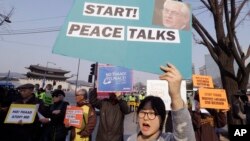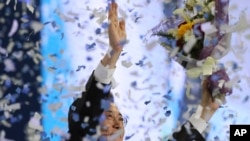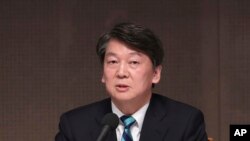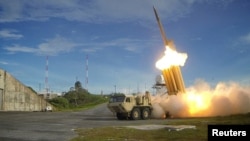South Korea is just one month away from a presidential election that is likely to produce a dramatic foreign policy shift that could ease inter-Korean tensions but put new strains on the U.S. alliance.
The early presidential election, scheduled for May 9, was precipitated by the impeachment of President Park Geun-hye for her alleged involvement in a multi-million dollar bribery scandal in which powerful Korean conglomerates were granted favors in exchange for donations to dubious foundations.
The impeachment of the conservative Park has disgraced the once popular leader, who is currently under arrest as prosecutors seek to gather sufficient evidence to indict her for bribery, extortion and abuse of power. If convicted she could face more than 10 years in prison.
In the wake of the scandal, Park’s conservative polices have also been discredited and her party divided.
The major South Korean parties have all now selected their presidential candidates, and the two leading contenders in public opinion polls are from liberal parties that have been out of power since 2008.
Democratic Party
The Democratic Party candidate for president, Moon Jae-in, is the current frontrunner with a 41 percent approval rating in the most recent Realmeter poll. A South Korean human rights lawyer, Moon ran in the 2012 election but lost to Park in part because he was seen then as too conciliatory toward North Korea.
Park’s hardline policies, however, have of late come under increased criticism as tensions on the Korean Peninsula have risen over the Kim Jong Un’s government’s accelerated efforts to advance its nuclear and ballistic missile capabilities. Moon said the impeached president’s punitive only approach to cut ties and focus on sanctions to pressure Pyongyang to cease and desist its nuclear program has failed.
If elected, the Democratic Party leader said he would like to revive a limited version of the past Sunshine Policy of Engagement that in the early 2000s tried to build trust with North Korea through investment, exchanges and aid programs, while also maintaining strong deterrence and international sanctions.
“We need to have two tracks of measures here. We need to be able to apply some pressure and coercion on North Korea, but on the other hand we should also start discussions and dialogue with North Korea,” said Moon.
Moon said he would support some deal to put in place a temporary freeze on the North Korean nuclear program that might lead down the road to further disarmament talks. His support for inter-Korean dialogue could put the South Korean leader at odds with the Trump administration in Washington, which has rejected a similar freeze plan suggested by the leadership in Beijing.
While he has voiced strong support for the U.S. alliance, Moon has also said South Korea should learn to say ‘No’ to the Americans. He has not directly opposed the U.S. THAAD anti-missile shield currently being deployed in South Korea, but has said it should be postponed until after the election, so the next president can better evaluate its diplomatic risk versus security benefit, and to better alleviate the concerns of China.
The interim conservative government in Seoul insists THAAD is needed to defend against North Korea’s increasing nuclear and missile capabilities. But Beijing strongly opposes THAAD as an unnecessary and provocative regional military escalation and voiced concern that the system’s powerful radar could be used to spy on them and other countries as well.
People’s Party
The more centrist Ahn Cheol-soo this week won the People's Party nomination. He is currently second in the Realmeter poll at 34 percent, but he has been slowly closing the gap in recent weeks with Moon. The South Korean software mogul pulled out of the 2012 presidential election to support Moon, but this time he vows to stay in and expects to win.
On national security Ahn takes a somewhat tougher stance than Moon, supporting THAAD and international sanctions imposed on North Korea for breaching United Nations Security Council resolutions banning its nuclear program. But Ahn says he too would press for inter-Korean talks at some point.
“What is the purpose of putting in sanctions against North Korea? Because we would like to persuade them to come to the negotiating table at the time we want and under the conditions that we want,” said Ahn.
Nuclear option
Park’s conservative Saenuri Party has split into loyalists who renamed themselves the Liberty Party Korea, and conservative impeachment supporters that left to form the Bareun Party. Both major conservative candidates stand to the right of impeached President Park on national security issues and neither is polling above 10 percent in the recent Realmeter poll.
Hong Joon-pyo, the Liberty Party Korea presidential candidate, is a former prosecutor. He currently stands at nine percent in the Realmeter poll. In his party nomination acceptance speech he promised to be a “resolute strongman” who can stand up to pressure from the United States, China, Japan, North Korea and Russia. A strong supporter of THAAD Hong said if elected he would, “immediately start discussions with the U.S. on the re-deployment of nuclear weapons” in South Korea.
In the early 1990s, the U.S. removed tactical nuclear weapons from South Korea and critics say reintroducing them would weaken international support for sanctions against the North’s nuclear program. Under the U.S. nuclear umbrella security arrangement, Washington has promised to use its offshore nuclear arsenal to defend the South from an attack from the North.
The Bareun Party’s presidential candidate Yoo Seong-min is only at three percent in the public approval poll. Once an aide to ex-President Park, Yoo successfully ran as an independent for the National Assembly where he voted for impeachment and then went on to establish his rival conservative party.
Yoo also supports the deployment of tactical nuclear weapons in South Korea to deter the North’s nuclear advancements. And on THAAD, Yoo says one anti-missile battery is not enough.
“What I argued for was not the deployment of just one battery of THAAD owned by the U.S. forces in Korea, but what I argued for was that South Korea set up three THAAD batteries paid for with our national defense budget.
The stagnant South Korean economy will be a major issue in the upcoming election and the major candidates have different positions on limiting the influence of the powerful conglomerates and increasing opportunity for young people who are encountering difficulties finding good paying jobs.
While Moon is the current leader of the pack, fortunes can change in the next few weeks. There are scenarios being discussed in which lessor candidates would throw their support to Ahn that would put him in the lead.








